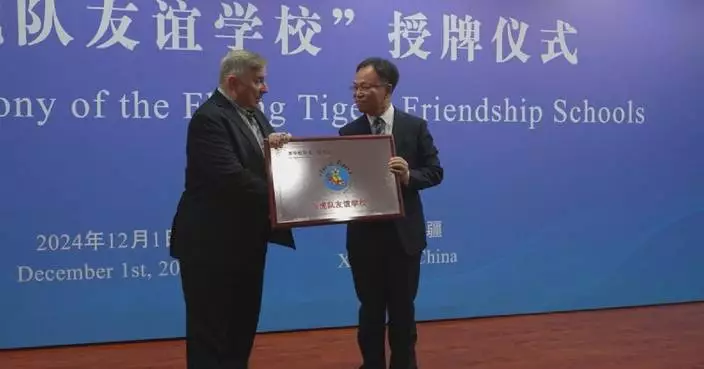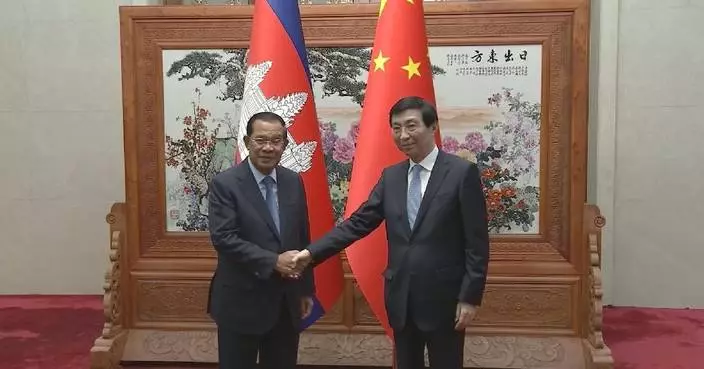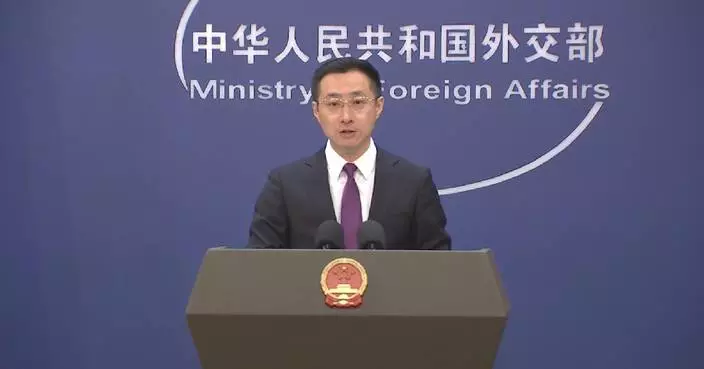The cotton industrial chain in Xinjiang Uygur Autonomous Region has seen rapid expansion and upgrading in recent years, with more enterprises producing a wide variety of value-added products through cutting-edge technologies, resulting in more efficient production and eco-friendly products.
Xinjiang, where over 90 percent of China's cotton is produced, has been making tremendous efforts to upgrade its cotton industrial chain from mere cultivation to further processing, including dyeing and value-added goods production.
In Bayingolin Mongolian Autonomous Prefecture, breakthroughs have been made in an economic and technological development zone in Korla, where cotton enterprises have turned their focus from producing treads to further processing.
"Washcloth is the final product of non-woven cloth we use every day, which is soft and skin friendly. We made it mainly with cotton produced in Xinjiang and the short fibers on cottonseeds. It is made through techniques like yarn spinning and further processing. It is widely used in daily goods such as cotton tissues, wet wipes, and facial masks," said Dai Qinran, deputy general manager of the Zhongtai Henghui Medical Sanitary Materials Company.
Some factories have upgraded their production process through an intelligent network, where numerous sensors can inform workers of the production situations in real time.
"Here is the sensor. It is capable of measuring the thickness of cotton mesh and identifying the breakages. With equipment as smart as this, we can find out the breakages in the shortest possible time," said Qu Li, a worker.
By discharging less sewage, using less dyes, and building more water treatment plants, dyeing companies in the cotton industrial chain are currently working to reduce pollution and lower their energy consumption.
"At the end of 2022, we built the water treatment plant right behind me. Our company is now adopting the salt-free dyeing technique in its production," said Wu Guofeng, deputy general manager of Huitongtai Dyeing Technology Company.
The cotton industrial chain in Xinjiang is set to produce more value-added goods, with the Korla Economic and Technological Development Zone targeting the textile and garment industry.
"Last year, Bayingolin Mongolian Autonomous Prefecture produced 1.14 million tonnes of cotton and now the prefecture is home to 112 textile and garment companies. This year, we estimated that the textile and garment industry will produce 12.7 billion yuan (about 2 billion U.S. dollars) worth of goods and create over 10,000 positions," said Duan Xueping, director of the local commerce bureau.

Xinjiang's cotton industry sees rapid expansion, upgrading of production links
China's State Council has unveiled an ambitious plan to grow its ice-and-snow economy, targeting winter sports, tourism and equipment manufacturing as key drivers of economic growth, with a projected value of 1.5 trillion yuan (some 207 billion U.S. dollars) by 2030.
Inspired by the success of the 2022 Beijing Winter Olympics, more and more Chinese citizens are embracing winter sports, with the sport's popularity in the country more than doubled, according to the China Ski Industry White Book.
Excalibur Liu, a 36-year-old ski enthusiast, frequently visits Cuiyunshan Ski Resort in Chongli, a district in Zhangjiakou City in Hebei Province.
"For me, it was love at first sight. About 10 years ago, I experienced skiing in Beijing for the first time, since my hometown is in the warm southwest region of China where it rarely snows in winter. And many people like us are very addicted to winter sports and skiing can bring us excitement and passion. It can also provide a new way to hang out with families and friends," said Liu.
Zhang Dongxu, manager of the ski resort, who also entered the industry a decade ago, has witnessed the industry's remarkable transformation.
"In the past, our ski resorts focused on purely the sports. But as people's pursuits have shifted from material to spiritual, there is now a greater demand for emotional experiences," said Zhang.
Zhang's resort saw a 70-percent increase in number of visitors during the last skiing season. He attributed the surge in skiers to infrastructure improvements from the 2022 Winter Olympics and emphasized the importance of continued government support for winter sports programs in schools.
For 28-year-old Wang Xiaoxu, a Chongli native, the growing ski industry has made a big difference. Previously, her parents had to leave town for work. Now, local job opportunities allow families to stay together.
"This means none of us have to experience being left-behind children. We can stay close to our parents. I feel the ski resort has greatly impacted our lives in many positive ways," Wang said.
To meet the 207-billion-dollar goal by 2030, the industry needs to maintain an annual growth rate of around 7.5 percent, which may be challenging given broader economic conditions.
Laurent Vanat, an international ski industry expert, pointed out that the ski market's growth is not always directly tied to economic trends, and that some regions have been able to ride out the worst impacts of any financial crises.
"The growth of the ski market is not necessarily directly connected to the economic growth. We have seen this, even when there are some economic downturns like the 2008 crisis. In the ski resorts, they [still] had a very good season, especially in some provinces. For instance, in Xinjiang there is an important growth and in Jilin Province, there is also an important growth," he said.

China sets sights on 207 billion USD winter sports economy










